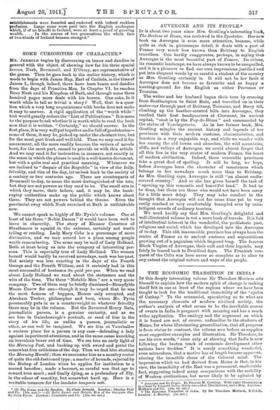SOME CURIOSITIES OF CHARACTER.*
MR. Jnnnonn begins by discoursing on beaux and dandies in general with the object of showing bow far his three special heroes, Nash, Brummell, and D'Orsay, are representative of the genus. Then he goes back to the earlier history, which is made to begin with James Hay, Earl of Carlisle, in the time of James I., though, indeed, there have been beaux and dandies from the days of Primitive Man. In Chapter VI. he reaches Beau Nash and his Kingdom of Bath, and through some three hundred pages more deals with his heroes. One asks, Is it worth while to tell so trivial a story P Well, that is a ques- tion which a very long acquaintance with books does not make it easy to answer. A rigid application of the "worth while" test would greatly reduce the " List of Publications." It is more to the purpose to ask whether it is worth while to read the book now that it is written. " Certainly," we should answer. In the first place, it is very well put together and is full of good stories— some of them, it may be, picked up under the chestnut tree, but for the most part fresh and well told. Then we may read it for amusement, all the more readily because the writers of novels have, for the most part, ceased to provide us with this article And we may read it for instruction in manners, not exactly in the sense in which the phrase is used in a well-known document, but with a quite real and practical meaning. Whenever we are inclined to "despair of the Republic" in view of the folly, frivolity, and vice of the day, let us look back to the society of a century or two centuries ago. There are counterparts of Brummell to-day, to name the most distinguished of the trio, but they are not powers as they used to be. The small sets in which they move, their tailors, and, it may be, the bank- ruptcy authorities make up the public which knows about them. They are not powers behind the throne. Even the provincial away which Nash exercised at Bath is unthinkable now.
We cannot speak so highly of Mr. Fyvie's volume. One at least of his three " Noble Dames " it would have been well to leave in obscurity. The story of Eleanor Countess of Strathmore is squalid in the extreme, certainly not worth telling or reading. Lady Mary Coke is a personage of more distinction, and we may accord her a place among people worth remembering. The same may be said of Lady Holland. Both at least bring us into the company of interesting per- sons. This is especially true of Lady Holland. The woman herself would hardly be received nowadays, such was her past. But society was less exacting in the days of the Fourth George and the Fourth William, and it certainly bad in this most successful of hostesses its quid pro quo. When we read about Lady Holland we read about the statesmen and the wits of the time. The three "Notable Men" are a very queer company. Two of them may be briefly dismissed—Bampfylde Moore Carew for one—though it may be urged that he was the most famous of beggars, Homer only excepted, and Abraham Tucker, philosopher and bore, whom Mr. Fyvie presumably puts in as a counterweight to whatever frivolity there may be in the volume. But the Reverend Henry Bate, journalistic parson, is a genuine curiosity, and as we see him in Gainsborough's portrait, or read of him in the story of his life, as unlike a parson, journalistic or other, as can well be imagined. We see him at Vauxhall— a curious place for a parson in any case—defending a lady against impertinent attentions, and in the same cause knocking an herculean boxer out of time. We see him an early light of the Morning Post, and backing up with sword and pistol the somewhat free criticisms of the day. Then we find him starting the Morning Herald ; then we encounter him as a country rector of quite the old-fashioned type; a master of hounds, rejected by the Bishop of London when he applies for institution to a second benefice ; made a baronet, so careful was that age to reward true merit ; and finally dying, as a prebendary of Ely, in the odour of sanctity, but somewhat hard up. Here is a veritable treasure for the laudator temporis acti.
• (I) The Beaux and the Dandies. By Clare Jerrold. London Stanley Paul and Co. (16s. net.]—(2) Noble Dames and Notable Men of the Georgian Era. By Ras Fyvie. London: Constable and Co. [les. 6d. net.)


































 Previous page
Previous page